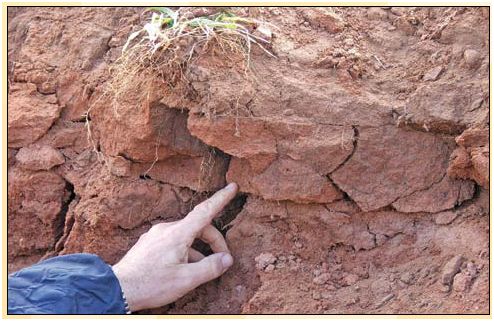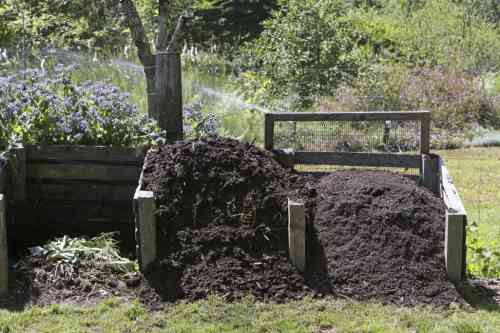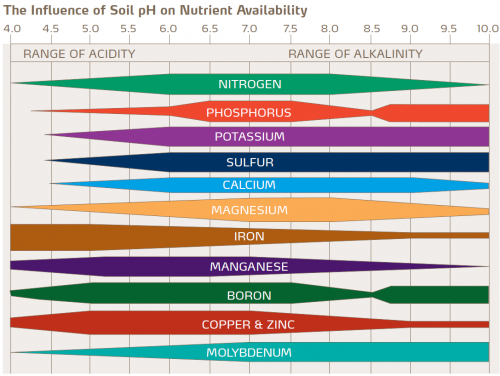The Weekly Watch
Growing Fertile Ground
Soil is a complex ecosystem, but you don't have to know engine mechanics to drive a car, nor soil ecology to grow a garden. Despite the wide ranging difference between soil types, building soil fertility is remarkably similar across most conditions. It boils down to the addition of biomass, organic material. There are many approaches. You can grow cover crops then "chop and drop" them as a mulch. Use the lasagna method with an initial layer of cardboard before applying organic amendments. Sheet composting is a common technique, although many people create and add compost and compost tea to their plants. Some people use a thick layer of wood chips to establish garden plots. Others go to additional lengths to bury woody material creating hugel beds or pits. Many urban growers use containers and literally build or create their own soil. In all these applications the objective is to promote the growth of the complex mixture of soil organisms which in turn benefit the plants you want to grow. Let's also take a brief look around the world to see if we can find some fertile opportunities for positive growth.

As I begin my studies of soils and productivity, I found the books of the 1930's and 40's more relevant than my textbooks of the 70's used in the university classroom of the day. People questioned more in the 30's and 40's....socialists, communists, labor, women and so on were all active. After the so called "green revolution" of the 50's, fertility was recognized in terms of chemistry - the nitrogen, potassium, and phosphorus content. We lost our understanding of soil health and biology. But books like The Soil and Health, The Living Soil, A Plowman's Folly (and A Second Look), J. I. Rodale's many publications, Ruth Stout's many books, The One Straw Revolution, Bill Mollison's permaculture design and so many others shaped my view....
including Louis Bromfield and his Malabar Farms...
I found a very interesting and thorough article by someone who followed a similar path...
https://www.westonaprice.org/health-topics/farm-ranch/a-history-of-organ...
I'm not quite cosmic enough for Rudolf Steiner, but I find his work interesting.
https://articles.mercola.com/sites/articles/archive/2017/07/01/biodynami...
These were the people that helped me understand the nature of soils. I did have several classes which expanded my understanding...soil morphology, plant ecology, bioclimatology, and others...but really it was those voices from the past which spoke to me about creating fertile soils. The Whole Earth Catalogue lead me to many of those sources. I became an early proponent of no-till cropping and gardening. My graduate work involved no-till grain sorghum planted into winter clovers. My path led me to Ruth Stout's mulch gardening technique.
Plowing aerates the soil and promotes water infiltration, but given time the soil biota will open and loosen soils for you naturally. Some of these soil organisms are obvious, like earthworms, but the subtle influence of fungi and other critters is rarely appreciated. People forget that plants (especially the roots) need to breathe. That's how you kill a plant by over watering....you drown the roots.

When you repeatedly plow year after year you compact the soil at the depth of plowing creating a "hardpan". Southern soils are prone to hardpan formation. When you dig a trench in a field with a backhoe so you can see the soil profile, you can actually see the type of tillage implements that had been used...moldboard plow, chisel plow, cultivators, and so on. Subsoiling (deep plowing) tends to drive the hardpan layer lower into the soil, but can provide a few years of better root growth and depth. Some plants have vigorous roots that can penetrate hardpan, and in these old crop fields planting one of these crops for a couple of years will largely cure the problem.
Check out this quarter acre no-till UK market garden
https://www.youtube.com/watch?v=XCAAL1saPzM (17 min)
Here's the lasagna method of no-till gardens
https://www.youtube.com/watch?v=RbEr2IDM69c (16 min)
or a shorter 6 min description...
https://www.youtube.com/watch?v=nuNUTTFYArY
Essentially this is variation of sheet composting
Here's larger scale (4 acre) minimum tillage market garden in NY
https://www.youtube.com/watch?v=XSvLkh5oOsY (6 min)
What you plant influences the soil health, structure, fertility, disease, and more. Here's an approach of planting crops that help one another and minimizes the need for mulch.
https://www.youtube.com/watch?v=DsCAb1w235Q (5 min)
Chop and drop is a good technique to grow your own mulch...
https://www.youtube.com/watch?v=7p9GsNRc0jQ (5 min)
There are as many approaches to promoting soil health as there are gardeners. However they all rely on organic material either grown in place, or brought in from elsewhere. These materials can be free. Picking up leaves in the fall. Wood chips are often free, especially if you can catch a tree trimming crew in your neighborhood. Some cities provide free or low cost mulch.

Compost is another method to build fertility. There are as many ways do make compost as there are mulch sources.
https://www.youtube.com/watch?v=_e4PVA7Hc9E (3 min)
As this fellow emphasizes there are no rules about how to make compost...
https://www.youtube.com/watch?v=fSIIEn1abc8 (9 min)
Many folks use earthworms to manufacture compost. Worm castings are powerful fertility builders. Here's one harvesting technique...
https://www.youtube.com/watch?v=kzRwnk4LcvM (11 min)
Some worm bins are designed to allow the casting to fall into a lower chamber for easy continual harvest https://www.youtube.com/watch?v=2smEluKUaJw (22 min)
The easiest method of spreading worm castings is by creating a worm tower in your garden beds. Here's a wooden tower project...
https://www.youtube.com/watch?v=F2F7-MK_wi8 (19 min)
Another approach is a combination planter worm container
https://www.youtube.com/watch?v=IxF3jq7nS2k (5 min)
Some folks swear by aerated compost tea ...
https://www.youtube.com/watch?v=JCK_pjcQOTo (6 min)
Each to their own, but I prefer to be a mulch gardener. I'm all for less work. Our beds have not been plowed for 30 years. However the soils are light and friable...and full of worms. Last soil test about 5 years ago revealed the garden soil is very fertile. Soil pH, acidity or alkalinity, is something worth addressing. The highly leached soils of the southeast are generally acid and require lime to neutralize. The pH affects nutrient availability. Here's a simple explanation...
https://www.youtube.com/watch?v=7Z15h189LCc (10 min)

Fertile Minds, Ideas, and Actions...
Fertility applies to more than just soils...describing people's imagination as fertile for example. Well, this week I caught a recently released interview with Noam from 2016. His mind is certainly fertile with ideas and knowledge. (35 min)
That led me to think about how people's minds are fertile for manipulation. Say Russia often enough and people become russiagaters. Say Maduro is an evil dictator often enough and US citizens are prepared to start a war.
Jimmy always does a good job describing this sort of manipulation.
10 mins on CNN lying about Venezuela https://www.youtube.com/watch?v=mhaTFe5X9EM
19 mins on Jorge Ramos' misrepresentation https://www.youtube.com/watch?v=sk7gkZiXWbA
8 mins on Twitters Russian bots morphing into Venezuelan bots
https://www.youtube.com/watch?v=9rfbR66Qxps
Did you catch the Russian ambassadors comments on Venezuela this week. He calls out US BS
https://www.youtube.com/watch?v=jASLKVexWWw (14 min)
Never the less there are some fertile concepts to build upon...like the Green New Deal. while I'm disappointed that domestic fuel production is not addressed in the current plan, there are many hopeful aspects of the Green New Deal (video or text)
https://therealnews.com/stories/a-climate-sociologist-explains-the-green...
https://therealnews.com/stories/why-a-housing-guarantee-should-be-in-the...
And as a conclusion to this discussion of fertility, I want to give a tip of the hat to all the young folks pushing for a sane approach to our life on planet Earth.

https://www.ecowatch.com/youth-climate-strike-2627959531.html
https://earther.gizmodo.com/students-are-preparing-for-the-first-major-u...
March 16
Can we stop this coup? If not, then plan on another Vietnam... in our neighborhood.

https://www.answercoalition.org/national_march_on_washington_hands_off_v...
April 3-4, 2019, Washington, D.C.
The North Atlantic Treaty Organization (NATO) is coming to Washington, D.C., on April 4. We’re organizing a peace festival to unwelcome them.

https://worldbeyondwar.org/notonato/
So I hope this weeks discussion trigger some fertile ideas in your mind, and I hope you'll share them and your stories below.


Comments
Good morning! Thank you so much for this discussion--
As you know, I'm a big fan of soil building, and have to continually hold myself back from a Divine Right-style soil reclamation (from a story in The Last Whole Earth Catalog called Divine Right's Trip--the main character, Divine Right, ended up taking over his grandad's old farm in West Virginia and rebuilding the soil with rabbit poop). I've been told by too many people I respect that building soil up is better than trying to fix the soil you've got, and since the whole thing is a continuous coterminous system, well, I have to bow to that logic.
As for the spiritual aspect of it, I adhere more to the Findhorn way of looking at things.
"More for Gore or the son of a drug lord--None of the above, fuck it, cut the cord."
--Zack de la Rocha
"I tell you I'll have nothing to do with the place...The roof of that hall is made of bones."
-- Fiver
Take what you got and make it better
It is interesting that the way to improve soils is the same in your sandy situation as in a clay soil. Adding biomass to sands improves both nutrient and water holding. In clay it lightens the soil improving tilth allowing for better water infiltration and improves release of nutrients.
Glad you came by this morning. Hope you and yours are doing well!
“Until justice rolls down like water and righteousness like a mighty stream.”
Yet another argument against inherited wealth:
Wealthy donor to Cochise County Sheriff's Department is raising concerns over his influence, Warren Buffet's son.
Paul Jay and Larry Wilkerson on Venezuela:
[video:https://www.youtube.com/watch?v=pkR9YWqfjsA width:500 height:300]
We wanted decent healthcare, a living wage and free college.
The Democrats gave us Biden and war instead.
Thanks for the links!
I just did watch Larry and Paul's interview. Too bad that isn't what people see on the Sunday talking head shows.
As to Buffet's influence...I like Dylan's line, "money doesn't talk, it swears".
Thanks again... Always appreciate your clips and articles!
“Until justice rolls down like water and righteousness like a mighty stream.”
posted this on Trump and Cohen
on me previous post about 'Trump will not go away peacefully.'
[video:https://youtu.be/zBuAaZ_AQno]
I found Wilkerson very eye-opening.
Good Morning, lookout, I have a little difficulties to concentrate on soils today, I stick always with the dirt. ... hope this is only temporarily.
Have all a good Sunday. I do not love our climate here at my side of the pond. Totally uninspiring. Grey, grey, more grey... Sigh.
Here is some sun for you:
[video:https://youtu.be/U_O1QKQCsGs]
Good Day, all.
https://www.euronews.com/live
I've been playing that one lately...
Thanks for dropping it here. It is raining again today. Had 1.5 inches Thursday night and Friday, and they are calling for 2 inches today. Rain, rain, and more rain....
As to dirt, in Ag school they told us what you see in the movie house is dirt, soil is what you plant into.
I was running short of time writing this piece and didn't include some other things I see a fertile efforts. One is the ever expanding teacher strikes in the US.
http://educationopportunitynetwork.org/denver-teachers-strike-was-a-reje...
http://educationopportunitynetwork.org/la-teachers-make-the-case-that-ch...
https://www.usatoday.com/story/news/education/2019/03/01/oakland-teacher...
Another fertile movement is the yellow vest.
http://finalwakeupcall.info/en/2019/02/27/the-yellow-vest-movement/
and as
I mentioned at the end of today column Sunrise and Extinction Rebellion
So I guess my point is there are some positive things happening. We need to support the forward momentum. Creating healthy soils and plants is a great way to reduce stress and improve attitudes.
All the best!
“Until justice rolls down like water and righteousness like a mighty stream.”
thanks, lookout, I am falling a little into
a cynical mode. Will stop it. Sorry for that.
https://www.euronews.com/live
The situation promotes cynicism
easy to be discouraged about many things. Do things that you feel are productive (paint, draw, write, sing,...), and soon your spirits will lift. A sunny day helps too.
keep on the sunnyside of life...
[video:https://www.youtube.com/watch?v=lh4b-8iChhY]
“Until justice rolls down like water and righteousness like a mighty stream.”
And so it goes on and on and on
MSNBC Yet Again Broadcasts Blatant Lies, This Time About Bernie Sanders’ Opening Speech, and Refuses to Correct Them -
Glenn Greenwald -March 3 2019, 5:31 p.m.
I think Sanders speech was posted here, but I do it again.
[video:https://youtu.be/OE-bqEjCeCo]
full event
[video:https://youtu.be/WLfBNQ8L0fc]
just Sanders speech
it's hard work to listen to long speeches... as it was said in the studio I once worked 'It is very important to make the right career choice, so think twice before going into journalism'.
https://www.euronews.com/live
First they ignore you...
(like they are doing with Tulsi)
The full saying is:
“first they ignore you, then they laugh at you, then they fight you, then you win”. This quote is frequently attributed to Mahatma Gandhi, but in actuality there is no record of the peace advocate ever saying this.
At any rate they are fighting Bernie. I continue to hold my hypothesis that the dims will not let Bernie be the nominee.
Thanks for the update!
“Until justice rolls down like water and righteousness like a mighty stream.”
then we have to fight them. If nothing else works
it's fighting mano a mano. Same thing for Tulsi.
https://www.euronews.com/live
Living vicariously through your gardening posts, Lookout;
wish i were still gardening so as to use some of the techniques in these Watches.
Wonderful info, thank you.
We have a lime problem up here or should i say lack of lime; Uncle Ned used to say, "All the lime's washed down to the sea." Thankfully, these high valleys have rather deep soil and is not as rocky as the foothills.
Right on cue, rain returned and will be followed by a deep freeze for a few days. UGH, i'm ready for Spring and as you know that takes until May up here.
Anyways, "keep on Gardening," love the work.
Good to see you this morning
Hope all is well in your corner. Our garden is pretty easy. We manured and mulched in early winter. We've already planted more lettuce, snow peas, garlic, and onions. we'll have to put on the row covers this week. Low temps in the low 20's and upper teens later next week.
Back when I was in your area, there was snow on the ground till March, and then additional snows into May. Guess those days are a thing of the past.
Have a good one!
“Until justice rolls down like water and righteousness like a mighty stream.”
Good Sunday morning, Lookout ~~
Great videos about soil - can’t wait to watch. We are warming in fits and starts, so I know spring is coming. I was in Santa Fe, yesterday, and the snow on the Jemez Mountains made them look majestic. It’s snowing up there today - we’re expecting rain Friday.
Have a beautiful Sunday, everyone!
"The “jumpers” reminded us that one day we will all face only one choice and that is how we will die, not how we will live." Chris Hedges on 9/11
spring is unfolding here...
daffodils are blooming along with quince, forsythia, spirea, and other early bloomers. Going to get zapped with temps in the teens later this week. Hope you find something useful in today's catalogue.
Have a nice day!
“Until justice rolls down like water and righteousness like a mighty stream.”
Finding your review of farming & gardening practices
interesting. It helps me understand where some of my practices may have originated. I have used hay mulch since the 1980's after taking care of an acerage developed by a Great Aunt & Uncle for a season. He passed after the extremely large garden was planted. It required little weeding, primarily harvesting and the desert soil need not need frequent watering. After reviewing the Ruth Stout info in the Weekly Watch, I am sure she was their inspiration to try. In their younger years they had used more labor intensive practices, an inexpensive way to create an exercise routine.
My focus has been primarily livestock was given my first cow at 2 years old. My Dad was a little excited with his new farming adventure and two daughters. When I bought this acreage found a monthly publication The Stockman Grass Farmer and it shifted my primary management practices from livestock to grass and the health of the supporting soil. Alan Nation was right if I managed the soil health by default it improved livestock health and profit. The current editor's focus is on fast business growth and the wise advice is no longer.
Have you ever read Allan Nations book The Moving Feast : A Cultural History of Heritage Foods in Southeast Mississippii?
Still yourself, deep water can absorb many disturbances with minimal reaction.
--When the opening appears release yourself.
I've not read Nation's book...
but sounds like I should.
I think animals are essential to restoration.
Joel Salatin - Polyface farm is an incredible integrated system. Here's his channel...
https://www.youtube.com/channel/UCNXzf4qLwpDXV2R2Kn_z5DQ
Way more than my homesteading vision, but so well engineered for the entire system.
Best of gardening to you as spring beckons.
“Until justice rolls down like water and righteousness like a mighty stream.”
Joel Salatin has inspired a new generation of farmers
by sharing the changes at Polyface Farm over the years. As the current Owner/Editor of The Stockman Grass Farmer he explains some of his differences with Allan's approach.
The articles appear to now be selected to increase advertising revenue as a primary goal rather than increased knowledge of the reader. Following the advice can become rather expensive. Farm business would have to grow to such a degree I would become a manager of employees rather than having the pleasure of doing the task myself. Neither is right or wrong, more a state of where one is in life. But one must keep an eye to net profits or you are quickly in trouble.
Still yourself, deep water can absorb many disturbances with minimal reaction.
--When the opening appears release yourself.
homesteading not farming is my trade
No matter how I pushed the pencil, I never could make farming pay. However, as a lifestyle of self-sufficiency it has been extremely fulfilling. A couple of buddies (vet and forester) from the Auburn days, moved here a few years after us. They tried a commercial operation hitting high value urban markets. They worked their ass off and basically broke even. Plus they still had their off farm jobs.
Having taught and now drawing pensions was a better path for us....as was our little home garden.
Didn't know the grass stockman aspect of the story. Thanks. I attended the international grasslands congress when it was held in Kentucky decades ago....one of the most interesting meetings I ever attended.
“Until justice rolls down like water and righteousness like a mighty stream.”
I first started 'layering...'
...when my Mom sent up an article from a Florida newspaper about 'lasagna' gardening. Like some other things in life, as soon as I read it, it made perfect sense and I knew instinctively it was right. I dumped 6 inches of leaves (stepped on and watered down) on my garden that winter, then about the same measure of composted horse manure, then 2" of salt marsh hay. My tomatoes that year crawled into the driveway!!! Since then I throw whatever I have at hand (leaves, salt marsh hay-- the farm down the street (the last one in town) went horse-free a few years back so no more manure--) and then come spring, I just pull back the top and plant seedlings or seeds. I used to rthrow my garbage just underneath the layer of salt marsh hay, but then rats came so I don't do that anymore. It's so wonderful-- magical really.
I started this plot about 18 years ago, and when I first dug up the soil (if one could call it that...) it was charcoal-grey inert dust, half of which floated away as I lifted it with my spade. It pleases me so much now to engage with this black and fecund richness, to smell it, feel it, see the worms in it, etc. At first I had two small plots on either side of the front door; now the plots have expanded to the edge of the driveway (wish I had a few acres!). The plot to the left was the flower garden; the veggies went to the right, which plot was about twice the size as the flower garden. As time went on, and I became aware of, and then alarmed at, the plight of pollinators, I pulled up the non-natives from the flower garden, and replaced them with natives. It pleases me so much to see them come now-- build it and they will come-- that the native flowers have now mostly taken over (by my hand) the veggie garden, though I must still have: scallions; pole beans; kale (which does incredibly well here); and a few tomatoes in pots up against the back wall. I can go to the grocery store or local farmners' markets-- the pollinators can't. I should point out I live on a major 4-lane highway. I can't tell you how much I delight in the hundreds and hundreds of bees (various sorts) butterflies, moths, hummingbirds, etc that visit, as the cars and trucks go racing past; (though it's very quiet on non-rush hour times). On holiday weekends, the Friday afternoon traffic comes to a standstill in front of my house, and many trapped motorists look and call out praise-- or just look. I hope many are inspired to go and do likewise. Never ever ever have used any kind of chemical fertilizer or pesticide-- wouldn't even if I needed to. My Milkweed and Joe-Pye Weed get to 8 and 9 feet tall, as do some kind of wild perennial sunflower (perhaps a Helenium? or Rudbeckia?) I pilfered by the side of the road just before that particular parcel of earth was wiped clean for a new condo development. Oddly enough, the largest amount of bees I have ever seen in my life were visiting a 'waste space' chain-linked old-- parking lot maybe? Something-- on the east Somerville-Charlestown line (I live just north of Boston) where hundreds and hundreds of goldenrod-- a veritable spree of goldenrod-- had deigned to grow. These were VERY late in the season-- and several now reside in my garden, and extend the pollinators' feast into mid-November. I try to look at the garden as a stage, and as one major player exits, I try to think of who shall come to the fore next, to feed the pollinators. And the night show can be even more rewarding, which is why I plant some highly-fragrant white flowering things (e.g, Nicotiana) here and there.
Before I moved here 20 years ago, I had a garden in a neighboring town. One idyllic 'nothing so rare as a day in June' afternoon, dreaming cumulus crowds adrift in a cobalt sky, it seemed to me the clouds were slowing down to take a look at my garden-- of course they were more than welcome. This garden was in the form of an allee, two mirror borders 25' long, separated by a six-foot wide stretch of lawn, leading to a home-made pond with waterfall. Heaven! I was on my knees, weeding, making my way along. At one point I became aware of this intermittent buzzing-- gone, then back again. I was just under the birdbath at that point, and very very slowly-- but inevitably, like a moonrise-- I raised my head and observed an apparently thirsty bee, making circles around the edge of the birdbath like a plane waiting to land at a busy airport. I darley (this is a made-up phrase in my family-- combining 'barely' and 'I hardly dared--') breathed as I watched the bee land at the dry end of the birdbath, then work her way down to the edge of the water on these exquisite, stilty, thread-like legs as red and delicate as saffron. It paused, seeming to smell the water-- my enchanted eye perhaps 3" away-- then, satisfied, it bent its body to drink. A miraculous little salmon-colored tongue came out, and as the bee drank, I could see little swallow-gulps pulsing further down its body. Nunc dimittis! I had never entertained the idea before that bees drank water (duh!), and this seemed so extraordinary to me-- to learn this, and to witness it-- that I had to restrain from cavorting. The funny thing is, no doubt I did many things that summer-- went away a lot, probably 'hooked up' a number of times (my weekend destination was P-Town in those days-- nuff said), ate a number of great meals, saw this, and saw that-- but the only memory that remains of that entire summer was this, as if the Great Curtain had drawn back, and I was given a glimpse of that which is ordinarily hidden. How lucky was I among mortals!
Finally I would like to point readers to this wonderful online book, provided free-of-charge, by a retired Jesuit who returned home to Kentucky to find nature-- and people-- under assault. His remedy was to turn empty parking lots into community gardens. The book is called 'Spiritual Growth through Domestic Gardening' and is quite enjoyable, quite rewarding, and full of strange little enchantments (massaging Mother Earth, for example.) It can be found just by googling the name of the book.
Oh, one more finally-- I usually end up finding something new and exciting to grow every year-- since my very very favorite flower in the world (or one of them anyway) is Heavenly Blue Morning Glories (plant them by a door or window and it's like the big bluey sky rushing in to greet you every morning), this winter I came across Japanese Imperial Morning Glories, Ipomea nil as botanists call them. The Japanese have been growing them since about the year 900, have festivals in their honor, have bred and cross-bred them over and over, have lots of poetry, song, story, and art about them, and often grow them in pots a la bonsai, often removing all other buds to create one MASSIVE bloom (I could go on....). I was like-- wait, WHAT??? And the names of the various varieties!!!! 'Ripples on the Beach,' 'Mountain Streams of Light,' 'Moonlight on Mt. Fuji--' well, you get the idea. Here's the amazing thing-- Morning Glories are native to central and South America, and botanists have no idea how the seed/plant got to Japan centuries before any inter-continental travel. The plants are very chary (we love that word) with their seed, and thus the seed is pricey ($4, $5, $6 and up for ten seeds) and I'm having a challenging time getting them to germinate, or grow once they do germinate (could be my drafty windowsills at night-- they prefer the heat-- at any rate they're sulking) despite OM-ing and OHM-ing and singing at them several times a day-- to say nothing of frequently-dispersed compliments that would (one would think) turn anyone's head.
Sorry for taking up so much of your time for those who are still with me-- whatever baleen of a filter I may possess goes missing (as they say in the nautical world) when the subject turns to gardens. Or coins. Or books. Or politics. Thanks for this diary!
Semper ubi sub ubi
What a wonderful comment...
on the wonder of gardening, and the way it draws you into nature...making you feel a part of the larger system. The Heavenly blue fills the fence of our garden entrance in the summer. I'll keep an eye out for the Japanese Imperia.
Ipomea are hard seeded. Scoring the seed with a triangular file will help the seed imbibe water and sprout. https://homeguides.sfgate.com/ways-germinate-white-moonflower-seeds-4050...
I like to use heated pads under my seedlings. They are available commercially...
https://www.johnnyseeds.com/tools-supplies/seed-starting-supplies/seedli...
...or you can make your own...
http://www.vegetablegardener.com/item/11658/diy-heat-mat-speeds-seed-sta...
Best of gardening joy to you!
“Until justice rolls down like water and righteousness like a mighty stream.”
@Lookout Thank you Lookout! Yes,
Thank you Lookout! Yes, have been scoring, then soaking-- but the bets things in life don't come easy, they say....
Semper ubi sub ubi
Watering bees, birds and other small fling critters
The sides of my stock tanks and ornamental pond are not always safe for getting a drink and the ditch has a fast current. I toss a none treated board in the water to the birds and insects to land and take off. A couple of benefits less dead critters in the stock water and more birds signing.
Still yourself, deep water can absorb many disturbances with minimal reaction.
--When the opening appears release yourself.
@studentofearth Bless you!
Bless you!
Semper ubi sub ubi
Visual Giggle - #whigged
Lumpy Louise doin' some 'shoppin'n'shamin' Guillotine just around the corner?
Scroll down the thread on the twitter machine.
.
Compensated Spokes Model for Big Poor.
#whigged
.
.
Compensated Spokes Model for Big Poor.
one more #whigged, the rest on the twitter
.
.
Compensated Spokes Model for Big Poor.
Those dims want universal coverage...
...not medicare for all which would provide universal coverage.
I've been suspicious about the new bill and have not really looked at it yet. I hope it is as good as rumor has it to be. Thanks for the info!
“Until justice rolls down like water and righteousness like a mighty stream.”
Human agriculture is contrary to a sustainable Earth
OK, you are all going to hate my comment, but here goes. Forests and Savannah grasslands with grazing animals are sustainable. Cleared fields planted with human agricultural crops are not. They absorb net oxygen and emit carbon dioxide and methane. Even if they are organic and not tilled. If they are fertile enough to support vigorous plant growth they are releasing nutrients into the watershed, whether by organic methods or by chemical. Don't get me wrong. I have been gardening only by organic methods since around 1972. I love good rich soil and fresh, healthy vegetables that I harvest, and will continue to do so until I die. The reality is that this is not compatible with a stable bioshere and is an extreme negative factor for human survival as a species. The results of Biosphere II, an experimental enclosed biome:
We are the first species to perform large open field agriculture. It is what has allowed us to grow way beyond sustainability. Again, there is no evolutionary analog in a natural biosphere in all of Earth's history.
So what can we do to survive? Well, we did just fine up until about 11,000 years agos, based on hunting and gathering. But this was with a much, much smaller human population, about 5 million by many estimates. Today we are about 6,500 million and trending towards 10,000 million before the end of the century.
But the possibility of smaller human population groups isn't quite this bad.
There are some reasonably sustainable paths. Nut trees are very good. Sustainable harvesting of wildlife, including fish species -- works. Berries are great. The goal here is to emulate a hunter gatherer society, but with a much larger harvest through planned natural agriculture of naturally sustainable species. We replace non productive species of trees and shrugs and roots and replace them with productive species, that are equally as sustainable. How large a human population can we support? Good question. I would guess (wild) about 1 billion tops. Paring down to that will be easy, global climate crisis will do that for us as large scale open agriculture becomes non productive and higher temperatures and climate chaos. So the question comes down to this -- will anyone plan for a follow-on civilization that is sustainable, or is this it?
Capitalism has always been the rule of the people by the oligarchs. You only have two choices, eliminate them or restrict their power.
It does not take much space to intensive garden
greens, root vegetables and a few grains to supplement a diet that includes grass fed meats. The grazing areas also support wildlife. We need to move past concentrating livestock in high production spaces instead of increasing the number of high density producers.
Using the animals I raise to feed myself and the pets has been an eye opener. One of my cats eats more meat in a year than myself. When buying the food as dry kibble it is easy not to notice.
Controlling population or a planned decrease is anti-capitalist in the extreme. Where would the new consumers and low wage worker come from for the future.
Your points are good on least impact on the earth.
Still yourself, deep water can absorb many disturbances with minimal reaction.
--When the opening appears release yourself.